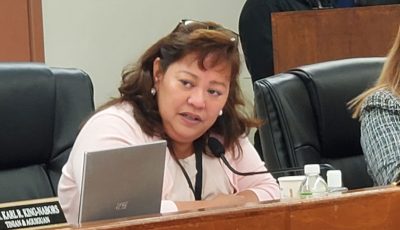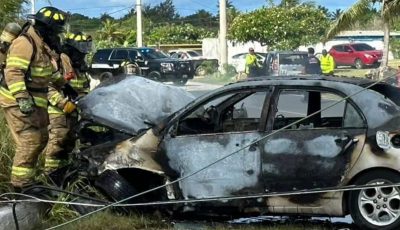IN BREAKDOWN OF EXPENSES LEAKED:
CUC board spends $92K in 2 years
The Commonwealth’s cash-strapped utilities company’s board of directors has spent over $80,000 on travel and per diem expenses since they were re-established midway through 2014. Since that time, they’ve also spent over $12,000 on their honorariums, or stipends, for board meetings.
This according to a summary of board expenses that Saipan Tribune obtained yesterday that shows the current board of directors of the Commonwealth Utilities Corp. is in pace to outspend their fiscal year 2016 budget of $40,400. Other than per diem, the travel expenses lie on three to four board members who travel from off-island. Some board members are averaging nearly $1,000 per month in per diem.
If they broke their $40,000 budget, it would not be the first time the board outspent their budget. They did that last year. By July 2015, the CUC board had outspent by $17,704 its year-to-date budget of $24,925 nine months into the fiscal year. They spent a total of $45,767.28 against an original budget of $33,000, which was later amended to around $50,000 to give room for the over-expenditures, Saipan Tribune learned.
According to the budget expense breakdown fro FY 2016, the board right now is at some $24,439 in expenses. This is largely attributed to per diem at some $15,800 and airfare and car rental costs at around $5,870 and $2,700, respectively.
Fiscal year 2016 honorarium costs are at $4,500 right now, compared to $6,180 last fiscal year.
The budget breakdown is as of last April 26, 2016. The fiscal year starts in October.
Last week the board also held meetings on Rota with five members attending.
House minority leader Rep. Ramon Tebuteb (Ind-Saipan) raised concern yesterday with the utilities company’s board’s costs, comparing his concern likewise to concerns with lawmaker government travel across the board and advised against travel when if unnecessary.
“I mean just look at the cost. It only makes sense when we have outstanding obligations of this government,” he told Saipan Tribune.
“They are justifiable travels, I am not saying no. But when you have these kinds” of costs and obligations, “I think we can accomplish the same things even [if] we don’t have to inter-island travel,” he said.
So far in FY 2016, board member Albert Taitano, from Rota, has spent $2,551 and $925 on airfare and car rental. He has collected $5,775 in per diem.
Director Eric San Nicolas, from Tinian, has spent $1,690.50 and $1,498 on airfare and car rental respectively, while collecting $7,087.50 in per diem
Director Ignacio Perez, who joined the board in February and is from Tinian, is tagged with $345 for airfare and has collected $1,400 for per diem.
Director David Sablan, who flies in from where he lives in Guam, has spent $680.98 and $117.50 on airfare and car rentals, respectively, while collecting $525 for per diem. He does not regularly attend board meeting in person compared to other board members.
‘Practice what you preach’
Sablan wrote an email to CUC board members and management of his concern with the travel costs yesterday, raising the alarm against what he suggested where unnecessary or avoidable costs.
Sablan called board members out for clamoring for cost-cuts at the administrative level but not doing so at the board level.
In that email, copies of which were obtained by Saipan Tribune yesterday, Sablan airs concern with reasons for holding their meeting on Rota this month, citing one reason from a board member to “allow the general public on Rota to attend the meeting and voice any concerns.”
However, no one from Rota aired comments during the public comment period last week. Other than the board and management, the meeting was attended by members of the media.
Sablan said that in an earlier email before the Rota meeting, he had outlined the difference in expenses between holding a meeting on Saipan versus Rota.
He argued that because their bylaws held them to hold meetings on Tinian and Rota once a year and that since “it was only in the bylaws,” they could have been “easily…waived on the record.”
“And henceforth hold all meetings on Saipan ’till we pass a budget that allows for such meetings,” Sablan said.
He added that the board “did not budget for an off-Saipan meeting” this fiscal year.
“To-date we have cost CUC $92,742 for the 24 months (March 2014 through March 2016) we have been operating as a board—$12,360 was for the meeting honoraria or stipends; the balance of $80,382 was for per diem, rental car expenses and air fares for 3-4 members,” Sablan wrote.
Sablan’s email indicated that the board members were polled on where the meeting should be held; and that director Joe Torres sent an email to staff to proceed with travel and hotel arrangements for Rota despite concerns from the Sablan and Roberto on costs.
Sablan went on to say that he decided to not attend the Rota meeting to “cut down on board expenses.”
“From the last report I received on our board expenditures, we are easily going to exceed our budget again for FY 2016. We exceeded our budget as well for FY 2015. This is not a good “track-record,”’ he stressed, urging that board members to be “prudent” in their expenses.”
“…We talk about cutting expenses in operations and administration, but at the board level, we don’t seem to exercise “what we preach,” he added. “ We may be creating a double standard, which will foster dissention among the staff, undermine morale, and further reduce productivity. Of all the CUC resources at our disposal, the human resource element can see and voice their disdain of the board by not caring to do their jobs to their fullest capabilities.”



























